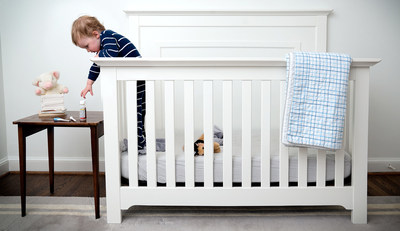WASHINGTON, Dec. 4, 2017 /PRNewswire-HISPANIC PR WIRE/ — The Centers for Disease Control and Prevention (CDC), Up and Away campaign, and Safe Kids Worldwide are reminding parents to keep their medicines stored up and away, out of reach and sight during this cold and flu season.

“Every year, approximately 60,000 young children end up in the emergency room due to accidental medicine ingestions,” said Dan Budnitz, Director of the Medication Safety Program at CDC and coordinator of the CDC-led PROTECT Initiative, which focuses on children’s medication safety. “Parents want to keep their children safe, and it is important to take action and practice safe medicine storage to prevent future visits to the emergency room, during an active cold and flu season and year-round.”
A 2017 Safe Kids Worldwide report shows that almost half of parents believe it’s okay to keep medicines visible on the kitchen counter or another handy location between doses when a child is sick. The report also shows that although most parents know what to do to protect kids from accidental medicine ingestions, that knowledge doesn’t always translate into action.
“It is important not to underestimate a child’s ability to get into medicines left within reach,” said Torine Creppy, Interim President at Safe Kids Worldwide. “As medicine use increases during cold and flu season, it is critical that parents place caution ahead of convenience and store medicines out of reach and sight every time—even between doses.”
The CDC, Safe Kids Worldwide, and Up and Away urge parents to follow these tips to keep their children safe:
- Store medicine up and away, out of reach and sight every time.
- Keep medicine in its original child-resistant packaging, and always relock the safety cap on medicine bottles.
- Pick a place to store medicines up and away and out of sight in your home as soon as your first child is born.
- Save the Poison Help number – 1-800-222-1222 – in your phone, or text “POISON” to 797979 to save the information automatically.
- Use safe reminder tools (like cell phone alarms or medication schedules) instead of keeping medicines within sight.
Additional resources on safe medicine storage are available at UpandAway.org.
About Up and Away
Up and Away and Out of Sight is an educational campaign to remind families about the importance of safe medicine storage around young children. It is an initiative of PROTECT in partnership with the CDC and the CHPA Educational Foundation. For more information, visit UpandAway.org.
About Safe Kids Worldwide
Safe Kids Worldwide is a nonprofit organization working to prevent childhood injury, the number one cause of death for children in the United States. Throughout the world, almost one million children die of an injury each year, and almost every one of these tragedies is preventable. Safe Kids works with an extensive network of more than 400 coalitions in the U.S. and with partners in more than 30 countries to reduce traffic injuries, drownings, falls, burns, poisonings and more. Since 1988, Safe Kids has helped reduce the U.S. childhood death rate from unintentional injury by 60 percent. Working together, we can do much more for kids everywhere. Join our effort at safekids.org.
About Centers for Disease Control and Prevention (CDC) PROTECT Initiative
The PROTECT Initiative is a collaboration among public health agencies, private sector companies, professional organizations, consumer/patient advocates, and academic experts to develop strategies to keep children safe from unintentional medication overdoses. For more information, visit CDC.gov/MedicationSafety/PROTECT/PROTECT_Initiative.html.
Photo – http://mma.prnewswire.com/media/614440/Up_and_Away_Cold_and_Flu_Crib.jpg
SOURCE Up and Away





